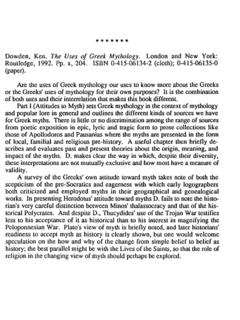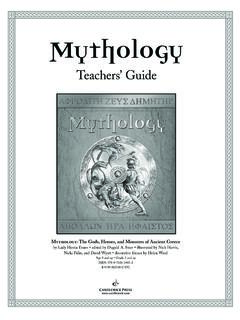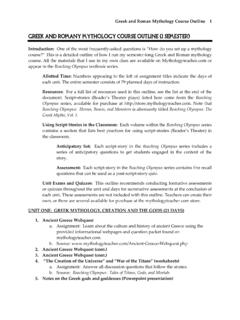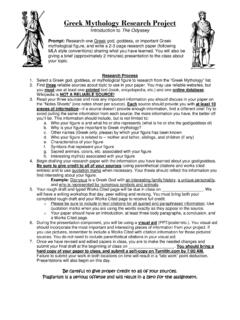Transcription of SECTION 3 Greek Mythology and Literature
1 DionysusSECTION242 What You Will Mythology and LiteratureIf YOU were a farmer in ancient Greece, your way of life depends on events in nature. The crops you grow need sunshine and rain, though thunder and lightning scare you. When you look up at the night sky, you wonder about the twinkling lights you see there. You know that at certain times of the year, the weather will turn cold and gray and plants will die. Then, a few months later, green plants will grow might you explain these natural events?BUILDING BACKGROUND The Greeks lived in a time long before the development of science. To them, natural events like thunder-storms and changing seasons were mysterious. Today we can explain what causes these events. But to the Greeks, they seemed like the work of powerful gods.
2 1. The Greeks created myths to explain the world. 2. Ancient Greek Literature provides some of the world s greatest poems and stories. 3. Greek Literature lives on and influences our world even ancient Greeks created great myths and works of litera-ture that influence the way we speak and write Big IdeaMain IdeasKey Terms and Peoplemythology, p. 243 Homer, p. 246 Sappho, p. 247 Aesop, p. 247fables, p. 247 AthenaPoseidonHephaestusHestiaDemeterUse the graphic organizer online to record characteristics of Greek myths and Literature . 2427/10/10 10:44:10 AMGreek Mythology and LiteratureMyths Explain the WorldThe ancient Greeks believed in many gods. These gods were at the center of Greek Mythology a body of stories about gods and heroes that try to explain how the world works.
3 Each story, or myth, explained natural or historical GodsPeople today have scientifi c explanations for events like thunder, earthquakes, and volcanic eruptions. The ancient Greeks did not. They believed their gods caused these events to happen, and they created myths to explain the gods the most important Greek gods were the ones in the picture below: Zeus, king of the gods Hera, queen of the gods Poseidon, god of the sea Hades, god of the underworld Demeter, goddess of agriculture Hestia, goddess of the hearth Athena, goddess of wisdom Apollo, god of the sun Artemis, goddess of the moon Ares, god of war Aphrodite, goddess of love Hephaestus, god of metalworking Dionysus, god of celebration Hermes, the messenger godANCIENT GREECE 243 ArtemisAthenaAresAphroditeApolloHadesHer aZeusHermesANALYZING VISUALSWhat can you see that indicates the Olympian gods have superhuman powers?
4 ANALYSISSKILLO lympian GodsVIDEOThe 2437/10/10 10:44:39 AMGods and MythologyThe Greeks saw the work of the gods in events all around them. For example, the Greeks lived in an area where volcanic eruptions were common. To explain these eruptions, they told stories about the god Hephaestus (hi-F E S-tuhs), who lived under-ground. The fi re and lava that poured out of volcanoes, the Greeks said, came from the huge fi res of the god s forge. At this forge he created weapons and armor for the other Greeks did not think the gods spent all their time creating disasters, though. They also believed the gods caused daily events. For example, they believed the god-dess of agriculture, Demeter (di-M E E-tuhr), created the seasons. According to Greek myth, Demeter had a daughter who was kidnapped by another god.
5 The desperate goddess begged the god to let her daugh-ter go, and eventually he agreed to let her return to her mother for six months every year. During the winter, Demeter is sepa-rated from her daughter and misses her. In her grief, she doesn t let plants grow. When her daughter comes home, the goddess is happy, and summer comes to Greece. To the Greeks, this story explained why win-ter came every keep the gods happy, the Greeks built great temples to honor them all aroundGreece. In return, however, they expected the gods to give them help when they needed it. For example, many Greeks in need of advice traveled to Delphi, a city in central Greece. There they spoke to the oracle, a female priest of Apollo to whom they thought the god gave answers.
6 The oracle at Delphi was so respected that Greek leaders sometimes asked her for advice about how to rule their the HeroAccording to legend, Athens had to send 14 people to Crete every year to be eaten by the Minotaur, a terrible monster. But Theseus, a hero from Athens, trav-eled to Crete and killed the Minotaur, freeing the people of Athens from this 2447/10/10 10:45:30 AMHeroes and MythologyNot all Greek myths were about gods. Many told about the adventures of great heroes. Some of these heroes were real people, while others were not. The Greeks loved to tell the stories of heroes who had special abilities and faced terrible monsters. The people of each city had their favorite hero, usually someone from people of Athens, for example, told stories about the hero Theseus.
7 According to legend, he traveled to Crete and killed the Minotaur, a terrible monster that was half human and half bull. People from northern Greece told myths about Jason and how he sailed across the seas in search of a great treasure, fi ghting enemies the whole the most famous of all Greek heroes was a man called Hercules. The myths explain how Hercules fought many monsters and performed nearly impossible tasks. For example, he fought and killed the hydra, a huge snake with nine heads and poisonous fangs. Every time Hercules cut off one of the monster s heads, two more heads grew in its place. In the end, Hercules had to burn the hydra s neck each time he cut off a head to keep a new head from growing. People from all parts of Greece enjoyed stories about Hercules and his great CHECK Finding Main Ideas How did the Greeks use myths to explain the world around them?
8 Let the Games Begin!One way the ancient Greeks honored their gods was by holding sporting contests like the one shown on the vase. The largest took place every four years at Olympia, a city in southern Greece. Held in honor of Zeus, this event was called the Olympic Games. Athletes competed in footraces, chariot races, boxing, wrestling, and throwing events. Only men could compete. The Greeks held these games every four years for more than 1,000 years, until the AD modern times, people began to hold the Olympics again. The first modern Olym-pics took place in Athens in 1896. Since then, athletes from many nations have assembled in cities around the world to compete. Today the Olympics include 28 sports, and both men and women participate. They are still held every four years.
9 In 2004 the Olympic Games once again returned to their birthplace, AYTOANCIENT GREECE 245 ANALYZING INFORMATIONHow do you think the modern Olympics are similar to the ancient Games? How do you think they are different? 2457/10/10 10:46:26 AMAncient Greek LiteratureBecause the Greeks loved myths and stories, it is no surprise that they created great works of Literature . Early Greek writers produced long epic poems, romantic poetry, and some of the world s most famous and Epic PoetryAmong the earliest Greek writings are two great epic poems, the Iliad and the Odys-sey, by a poet named Homer. Like most epics, both poems describe the deeds of great heroes. The heroes in Homer s poems fought in the Trojan War. In this war, the Mycenaean Greeks fought the Trojans, people of the city called Iliad tells the story of the last years of the Trojan War.
10 It focuses on the deeds of the Greeks, especially Achilles (uh-K I L-eez), the greatest of all Greek warriors. It describes in great detail the battles between the Greeks and their Trojan Odyssey describes the challenges that the Greek hero Odysseus (oh-D I-see-uhs) faced on his way home from the war. For 10 years after the war ends, Odysseus tries to get home, but many obstacles stand in his way. He has to fi ght his way past ter-rible monsters, powerful magicians, and even angry the Iliad and the Odyssey are great tales of adventure. But to the Greeks Homer s poems were much more than just entertainment. They were central to the ancient Greek education system. People memorized long passages of the poems as part of their lessons. They admired Homer s poems and the heroes described in them as symbols of Greece s great s poems infl uenced later writ-ers.









